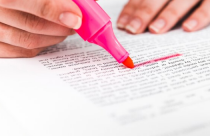An Insight into Manuscript Editing Processes: An Interview With Dr. Candace Pettus (Part 2)

 In the second part of our interview, we continue our conversation with Dr. Pettus and discuss with her the advantages of providing editorial suggestions to her clients. She also shares some important tips that would help new editors understand how they can improve their editing skills in the long term. Dr. Pettus also some shares some thoughts on how receiving feedback has helped her become a better editor. Finally, Dr. Pettus highlights the challenges she faces while editing manuscripts that are poorly written and describes her experience on trends she has come across in manuscripts written by ESL authors.
In the second part of our interview, we continue our conversation with Dr. Pettus and discuss with her the advantages of providing editorial suggestions to her clients. She also shares some important tips that would help new editors understand how they can improve their editing skills in the long term. Dr. Pettus also some shares some thoughts on how receiving feedback has helped her become a better editor. Finally, Dr. Pettus highlights the challenges she faces while editing manuscripts that are poorly written and describes her experience on trends she has come across in manuscripts written by ESL authors.
Do you think that feedback provided to the author via comments or edits actually help them or do you think providing suggestions in comments are a better option? Also, do you think that adding more comments related to the subject matter other than just grammar would be helpful?
I’m not really sure how to answer this question. I think that, depending on the feedback you receive from the authors, the manner in which you provide suggestions to a specific document might be different. If I were a person putting suggestions in a document to be edited, I probably would lean more towards just getting the job done. The author can then read what has been done and either like it or dislike it. Similarly, when I write my own documents, I have someone I go to.
How does feedback help you? Is there anything that you do to follow up on the feedback? Have you changed the way you edit depending on the feedback that you get?
Absolutely. I would suggest all new editors to listen to the collated feedback and make use of it. There are things that I’ve changed and I do appreciate the feedback I get as I think that it has made me a much better editor overall. New editors have to learn to listen and take feedback on board. Also, reading different articles from really good authors helps in the process too since some of them are quite good and you can learn quite a lot from the authors as well. Coming back to the feedback, yes, I do read everything that is sent back to me, and I take it on board and that’s what all other editors should be advised to do.
Do you have any suggestions for amateur editors to help them improve in their editing endeavours?
Well, I think you just have to be open to criticism, to other people reviewing you. That’s part of the process and you have to understand this especially when it comes to quality and appreciate the reviews you get from others. This is what new editors should be focusing on and not whether they’re getting criticised because they don’t do this or don’t do that. They should take feedback on board and then prove it as a result.
In your experience, have you noticed any trends that non-native English speakers usually make in their language or in the way they express their intent?
Yes, a lot of the papers are from Japan, and they are notorious for putting articles where they don’t need to be and then not putting them where they really should be, which can be quite distracting. It also depends a lot on the culture. I’ll give you an example: Germans are quite the opposite. When they write in English, they tend to reverse certain sentence structures. Hence, you have to be very careful not to untangle and lose their intent because they will have some other message that they have got in there which is the intent. So you have different styles and experience helps with that; when you realize that the paper is from a certain country, you get to understand that perhaps this is how they were taught English in school. Most often, the Japanese will say “especially” instead of “in particular.”
Could you give us an example of a manuscript that challenged your skills as an editor?
I actually just got done with one now. It was one of those things where you want to pound your head on the keyboard. You read a sentence and you knew there is a meaning there but you just don’t know what it is. As a suggestion to authors in this respect, I think they need to understand their limitations and be directed to a translator necessarily. I once had an Indonesian woman doing her Ph.D. dissertation in Australia. The topic was a really good one and I told her that the first step was to translate the research and once she did that it was very good. So I think some of the authors in this case would be better advised to get a translation service. In other words, I could have added more value to them as an editor, if I had a better idea of what they were trying to say.
This concludes our interview series with Dr. Candace Pettus. It was a great experience talking to her and we thank her for her time.
(This interview is a part of our interview series of connecting scholarly publishing experts and researchers.)








